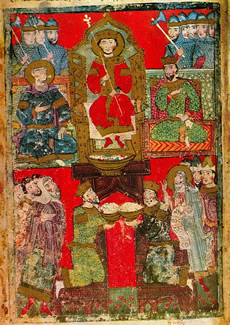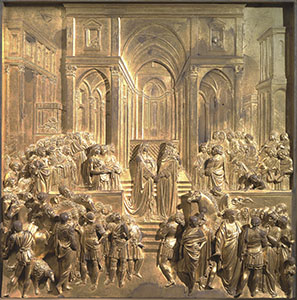For Sunday July 30, 2017
Lectionary Readings (Revised Common Lectionary, Year A)
Genesis 29:15–28, or 1 Kings 3:5–12
Psalm 105:1–11, 45b, or Psalm 119:129–136
Romans 8:26–39
Matthew 13:31–33, 44–52
Ask whatever you wish. It's the stuff of childhood fantasies, like waving a magic wand. But that's what happened to King Solomon, who had a dream in which God invited him to ask for whatever he wanted (1 Kings 3:5–12).
It's easy to hear literary echoes of this story in Jesus's similar command to his own disciples a thousand years after Solomon: "Ask me for anything in my name and I will do it" (John 14:13–14).
So, ask what you wish. What do you want?
In his book Let Your Life Speak (2000), Parker Palmer tells a story about the time he was offered the presidency of a small educational institution. He wanted the job, and thought that he should take it. Nevertheless, given his Quaker tradition, he assembled a "clearness committee" of a half-dozen trusted friends. Their job wasn't to give him advice, but to ask honest, open-ended questions so that Palmer could discern his vocational call for himself.
Halfway through this three-hour meeting, a friend asked Palmer why he wanted the job. What would he like most about being president? He mentioned several things he would not enjoy, like wearing a tie, at which his friend pointed out that he wasn't answering the question.
Palmer paused, thought a bit, then "gave an answer that appalled even me as I spoke it: 'Well,' I said, in the smallest voice I possess, 'I guess what I'd like most is getting my picture in the paper with the word 'president' under it.'"
 |
|
King Solomon, 15th century Georgian mss.
|
He concludes: "I was sitting with seasoned Quakers who knew that though my answer was laughable, my mortal soul was clearly at stake! They did not laugh at all but went into a long and serious silence — a silence in which I could only sweat and inwardly groan. Finally, my questioner broke the silence with a question that cracked all of us up — and cracked me open: 'Parker, can you think of an easier way to get your picture in the paper?'"
"By then it was obvious, even to me, that my desire to be president had much more to do with my ego than with the ecology of my life." The clearness committee had made things clear, and Palmer withdrew his name from the search.
Palmer isn't alone, maybe just more honest than many of us, and maybe more in touch with his divided self. His story reveals the challenge of the Solomonic invitation to ask God for whatever we want — what we want reveals who we are.
If human sin is essentially what Augustine called a heart incurvatus in se — "curved in on itself," it's healthy to acknowledge how often our pious prayers are little more than selfish whims. A bigger house. A better job.
In his little book Chapters on Prayer (#31 and 32), Evagrios the Solitary (345–399) thus advised, "Pray not to this end, that your own desires be fulfilled. You can be sure they do not fully accord with the will of God."
Drawing upon his own experiences, Evagrios admitted that "often when I have prayed I have asked for what I thought was good, and persisted in my petition, stupidly importuning the will of God… But when I have obtained what I asked for, I have been very sorry because the thing turned out not to be as I had thought."
 |
|
Queen of Sheba meets King Solomon, Lorenzo Ghberti (15th c.).
|
As we know in this famous story, instead of asking for long life, great wealth, or death to his enemies, Solomon asked for a "discerning heart." Even if the purpose of this story is to flatter the king, to make him look good to history, praying for a "discerning heart" is nonetheless wise advice.
Discernment deconstructs our prayers that try to bend the world to our selfish advantage. Although it's always imperfect, at its best, a discerning heart believes that God is unconditionally for you. It knows that nothing in all of creation can separate you from the love of God. The most discerning wish you can ever pray is to live in God's love and to accept his acceptance.
The epistle this week contains Paul's famously debated comments about God's election, foreknowledge, calling, and predestination. But instead of theological speculation about who is excluded by these mysteries, his focus is pastoral consolation about who is included in God's love. Paul's message is uncompromising: "nothing in all of creation can separate us from the love of God" (Romans 8:39).
He grocery-lists over twenty threats to our well-being — suffering, weakness, frustration, bondage to decay, ignorance, trouble, hardship, persecution, famine, nakedness, danger, sword, death, life, angels, demons, powers, the present, the future, heights, depths, and, as if he had overlooked something, he includes "anything else in all creation."
We can personalize our own lists: parents, children, the boss, employees, colleagues, bad choices, bedeviling sins, public failure, private disappointments, dark dreams, anxieties, school, a bad business deal, and on it goes.
But Paul is adamant: nothing can separate us from God's love.
 |
|
The Judgment of Solomon by Raphael, 16th c.
|
In the gospel this week Jesus describes the subtleties of God's kingdom that require a discerning heart. He says that the presence of God's kingdom is like a tiny mustard seed — something insignificant rather than extravagant, fragile and not mighty, unlikely rather than obvious.
His kingdom can also be imperceptible, like yeast leavening a batch of dough. It's difficult to detect unless you look carefully. It's not apparent, even though you know it's there somewhere.
God's reign is also like a fishnet containing the good and the bad together, or a field of wheat infested with weeds.
And so what do I want? I pray for a discerning heart in order to experience the ultimate reality of God's kingdom — that his perfect love is unconditional, and that nothing can separate me from his love. Everything else is penultimate.
Image credits: (1) Wikipedia.org; (2) vitruvio.imss.fi.it; and (3) PaintingAll.com.





